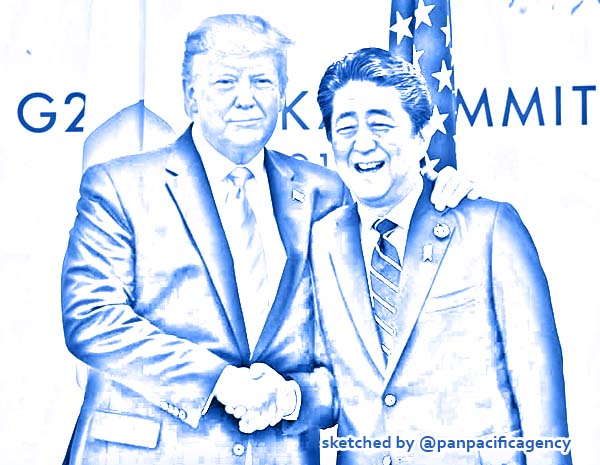Abe and Trump reaffirm military alliance despite dangerous dual nature of U.S. leader

U.S. President Donald Trump shakes hands with Prime Minister Shinzo Abe during the Group of 20 leaders summit in Osaka on Friday. | REUTERS / VIA KYODO. Sketched by the Pan Pacific Agency.
OSAKA, Jun 29, 2019, The Japan Times. Prime Minister Shinzo Abe and U.S. President Donald Trump met Friday in Osaka on the sidelines of the Group of 20 leaders’ meeting, with Abe praising the strength of the Japan-U.S. military alliance and Trump thanking Japanese firms for creating thousands of jobs by building dozens of manufacturing plants in the United States, reported The Japan Times.
“I visited the U.S. in April, and President Trump came to Japan as a state guest last month, followed by the G20 now,” Abe said at the outset of the meeting.
“The frequency of travels by top leaders of the two countries is proof of the strength of the Japan-U.S. alliance,” he added.
In response, Trump thanked Abe for his hospitality, including the state visit, where he became the first world leader to meet the new emperor earlier last month.
“We just left Japan and now we’re back,” Trump joked.
The U.S. leader said the day’s talks would focus on security and trade. He also thanked Japan for “sending many auto companies into Michigan and Ohio and Pennsylvania, North Carolina and a lot of our states.”
“I see they are building all over the United States,” he said. “A lot of the great Japanese car companies, other Japanese companies also, but in particular the car companies. Magnificent plants. We haven’t had that, and we very much appreciate it.”
The friendly exchanges between Trump and Abe, however, may seem a bit odd given the fact Trump strongly bashed the Japan-U.S. security treaty earlier this week during an interview with Fox Business.
In the interview Wednesday, Trump noted that under the military pact, which he has lambasted as unfair, Japan wouldn’t have to help the U.S. if it were attacked, though Washington would be required to come to Tokyo’s aid.
“If Japan is attacked, we will fight World War III,” he said. “We will go in and protect them with our lives and with our treasure. But if we’re attacked, Japan doesn’t have to help us. They can watch it on a Sony television.”
For Abe, Trump may be a monster withtwo faces: a golf-loving buddy who can defend Japan from China and North Korea, and a potential rival who could suddenly release pent-up frustrations on sensitive trade and security issues.
“He has long believed America has been forced to shoulder excessive burdens because of some frameworks of international relations. That’s why he has started advocating his ‘America First’ policy,” said Yasushi Watanabe, a professor at Keio University and expert on U.S. politics.
“Trump has held that frustration for so long, he can’t stop talking about it once he renews his awareness of it,” Watanabe said.
However, Trump has yet to seriously vent his frustration over the long-held American policy of using the Japan-U.S. military alliance as the centerpiece of key strategies for the Asia-Pacific region, including those against China.
“He himself said last month in Japan the Japan-U.S. alliance is important. So you don’t need to worry about it for now,” Watanabe said.
But at the same time, Watanabe and many other experts say Trump may be intentionally using his criticism of the Japan-U.S. military arrangements as leverage in trade negotiations with Tokyo.
The Fox interview probably brought the dangerous nature of Trump’s frustration home to Abe, Watanabe said.
Japanese officials have rushed to control damage from Trump’s blunt criticism of the Japan-U.S. security treaty.
On Friday in Tokyo, a high-ranking Foreign Ministry official was asked about Trump’s criticism of the Japan-U.S. security treaty. The official pointed out, “Trump has kept saying the same things” about the treaty for years, adding “that is different” from Japan’s view of the security arrangements.
Later the same day in Osaka, Deputy Chief Cabinet Secretary Yasutoshi Nishimura emphasized that neither Trump nor Abe mentioned Trump’s criticism during Friday’s summit meeting.
“The two leaders agreed to further strengthen the unshakable Japan-U.S. alliance as they have done in the past,” Nishimura said.
“There was no discussion of revising the Japan-U.S. security treaty at all,” he said.
On Thursday, John Bolton, Trump’s national security adviser and a hawk against China and Iran, held a hastily arranged meeting with Foreign Minister Taro Koto and tweeted: “Excellent meetings today in Osaka w/ Japanese Foreign Minister Taro Kono and National Security Advisor Shotaro Yachi. As we work jointly with Japan to tackle complex global challenges, I am continuously reminded of the pivotal importance of our alliance that is global in scope.”
Staff writers Jesse Johnson and Sakura Murakami contributed to this report